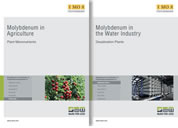Back | Latest news overview
IMOA publishes further case studies
12/06/2014

IMOA has published two further case studies showing how the unique properties of molybdenum are making a contribution to sustainable development in agriculture and the water industry.
The first study examines the use of molybdenum-containing stainless steel in the construction of seawater desalination plants. Water is essential to life but global supplies are under pressure from population growth and may be unable to sustain total demand by 2025. Desalination plants provide reliable, sustainable supplies of fresh water but need to be constructed from materials that can withstand such hostile environments. Molybdenum greatly increases resistance to corrosion and enables cost-effective, reliable operation.
The second study explores the sustainability benefits of correcting molybdenum deficiency in soil. Molybdenum is an essential micronutrient for plant growth, but some soils do not have enough. Applying fertilizer, seed or foliar treatments containing molybdenum can increase productivity significantly, optimizing output from existing agricultural production and helping to meet the needs of a growing population while minimizing the amount of additional land turned over to food production.
Commenting on the publications, Tim Outteridge, IMOA Secretary-General, said: “These further studies are part of IMOA’s ‘MoRE FOR LESS’ activity, highlighting the ways in which small amounts of molybdenum are making substantial contributions to sustainable development. Water scarcity and food security are both on the international development agenda at the moment and the fact that molybdenum has a role to play in both issues is testment to its versatility and range of appllications,” he said.
All seven case studies can be downloaded from the sustainability section of the IMOA website.
General information for media
IMOA is a non profit trade association, representing the majority of the molybdenum industry worldwide. It works to raise awareness about the unique properties of molybdenum, its beneficial effects on materials performance, its safety in use and its contribution to sustainable development.
Molybdenum is added to alloy steels to improve strength, toughness, hardenability and weldability for numerous applications in the automotive, shipbuilding, construction, mining, chemical, oil & gas and energy generation industries. In stainless steels and superalloys, it improves corrosion resistance and high-temperature performance and finds uses in many industrial applications. It is also used in a variety of products from catalysts and lubricants to pigments and paint.
IMOA has a strict antitrust compliance policy which delegates of all meetings are required to observe. All such meetings are observed by legal counsel.
For more information please email the communications team at media@imoa.info.
For up-to-date information please follow IMOA on Twitter and LinkedIn.
Back | Latest news overview

